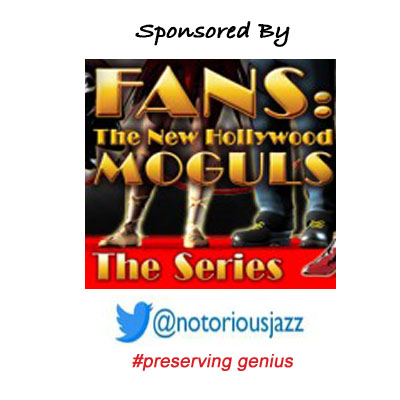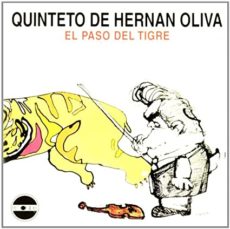
Daily Dose Of Jazz…
Hernán Oliva was born in Valparaíso, Chile on July 4, 1913 and began his violin studies at age 8 under a dominating mother. Around 1927 at the age of fourteen, he joined the Ernesto Davagnino Orchestra. Bohemian in character and dedicating himself to music over his father choice of law, his father disinherited and expelled from the home.
Around 1935 he crossed to Mendoza, Argentina and worked a few months on the LV10 radio in Cuyo, with his orchestra. Migrating to Buenos Aires, Argentina where Luis Davagnino, Ernesto’s brother, also a musician, lived, and after finding him whistling from corner to corner of Calle Alsina a tune that he knew Luis would recognize received him at his home after. Getting him a job as a companion to Betty Caruso and Fanny Loy on Radio Belgrano, then joined the René Cóspito Orchestra.
He played at the Boite La Chaumiere, with Enrique “Mono” Villegas on piano, David Washington on trumpet, and the English Phillips on sax. The following year Hernán joined the Oscar Alemán orchestra and by 1944 he began working with Ahmed Ratip’s Cotton Pickers, then with Tito Alberti and José Finkel they formed the Jazz Casino in 1951 with singer Lorna Warren.
His later years were spent hanging around the bars of San Telmo playing for whoever asked, sometimes for a glass of whiskey and for many who never appreciated his enormous talent. Violinist Hernán Oliva, who recorded six albums as a leader, passed away in the early morning of June 17, 1988 in Buenos Aires, Argentina lying on a sidewalk in the Palermo neighborhood, hugging his violin case.
More Posts: bandleader,history,instrumental,jazz,music,violin
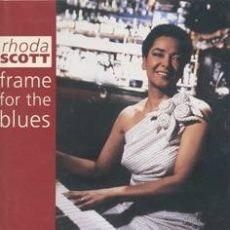
Daily Dose Of Jazz…
Rhoda Scott was born in Dorothy, New Jersey on July 3, 1938 the daughter of an A.M.E. pastor. She spent most of her childhood in New Jersey, where she learned to play the organ in her father’s churches from the age of seven. Soon she was organist for youth and gospel choirs in her father’s church or in other churches. Later she studied classical piano and focused more on the organ while earning a Masters in Music Theory from the Manhattan School of Music.
During this time, a choir member asked her to be in a small band as a jazz pianist. Accepting under the condition that she play the organ instead of the piano, and overtime on the Hammond organ, she became an outstanding jazz musician. She played the church organ barefoot, and continued this practice earning her the nickname “The Barefoot Lady”. It is considered a role model for many who also play the organ barefoot today. Because of her church training, Scott uses the pedals to play walking bass lines. This leaves her left hand free for more sophisticated chords.
Scott was discovered by Count Basie, who hired her for his club in Harlem, New York. In 1967 she moved to France, where her success was far greater than in the United States. She performed at the Paris Olympia and appeared on stage with many greats such as Ray Charles, George Benson , Ella Fitzgerald, Kenny Clarke and Gilbert Bécaud. In the 1970s she was frequently requested by Joe Thomas, Cees Kranenburg Jr., Bill Elliott, Kenny Clarke, Julie Saury, Sophie Alour, Lisa Cat-Berro, Anne Paceo, Géraldine Laurent, Julien Alour, and Thomas Derouineau.
Her music is a fusion of jazz, gospel, and classical and reflects both her early practice and formal training. Hard bop and soul-jazz organist Rhoda Scott, who has recorded eight albums from 1963 to today, continues to perform and record.
More Posts: bandleader,history,instrumental,jazz,music,organ
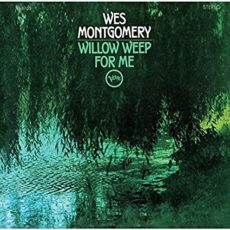
The Quarantined Jazz Voyager
Willow Weep for Me is a jazz album recorded in 1965 by guitarist Wes Montgomery and was posthumously released in 1969. The arranger and conductor on the session was Claus Ogerman.
The album reached number 12 on the Billboard Jazz album chart in 1969. At the 1970 Grammy Awards Willow Weep for Me won the Grammy Award for Best Jazz Instrumental Album, Individual or Group.
After Montgomery’s death in 1968, Verve Records used recordings from the sessions that produced Smokin’ at the Half Note and the label hired arranger Claus Ogerman to write string and brass arrangements for “Willow Weep for Me”, “Portrait of Jennie,” “Oh! You Crazy Moon,” and “Misty.” Subsequent reissues erased the new backing arrangements.
Track Listing | 41:09- Willow Weep for Me (Ann Ronell) – 7:42
- Impressions (John Coltrane) – 5:01
- Portrait of Jenny (Burdge, Robinson) – 2:45
- The Surrey with the Fringe on Top (Rodgers, Hammerstein II) – 5:20
- Oh, You Crazy Moon (Burke, Jimmy Van Heusen) – 5:27
- Four on Six (Wes Montgomery) – 9:29
- Misty (Johnny Burke, Erroll Garner) – 6:45
- Wes Montgomery – guitar
- Wynton Kelly – piano
- Paul Chambers – bass
- Jimmy Cobb – drums
More Posts: adventure,club,genius,guitar,jazz,museum,music,preserving,restaurant,travel,voyager
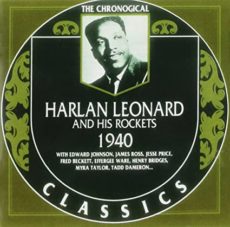
Daily Dose Of Jazz…
Harlan Leonard was born on July 2, 1905 in Kansas City, Missouri. He started his career in the Territory Band of George E. Lee in 1923, then moved to Benny Moten in 1924 and joined Thamon Hayes ‘ Kansas City Rockets in 1931 with several other musicians from the band. Disbanded in 1934, they formed the basis of the new Moten Orchestra. After Moten’s death in 1935, Leonard founded his own group, bringing several Moten musicians which became Harlan Leonard and his Rockets, and soon was one of the most famous bands in Kansas City.
After Count Basie’s departure for new YorkCity, he and Jay McShann were the strongest rivals. When the first Leonard band fell apart in 1936, he then took over the musicians of the Jimmy Keith band in 1937/38. In 1938 the young Charlie Parker also belonged to the band for five weeks but was dismissed because of unreliability.
In Chicago, Illinois in 1940, the band along with singer Myra Taylor recorded sessions for Victor Records. Returning to Kansas City in 1941, they toured the Midwest, then went to New York City but were unsuccessful so they returned home. Early 1943 Leonard went on a West Coast tour, playing one-nighters and a year engagement in Los Angeles, California.
After the band’s disbandment, Leonard remained in the Los Angeles area, performing occasionally in local clubs until retiring from the music business and working for the Internal Revenue Service.
Clarinetist, saxophonist, and Swing bandleader Harlan Leonard, who was one of the leaders of Kansas City Jazz with Jay McShann, and one of the links between the swing and the subsequent bebop, passed away on November 10, 1983.
More Posts: bandleader,clarinet,history,instrumental,jazz,saxophone

Daily Dose Of Jazz…
Michael Arlt was born in Bünde, Westfalen, Germany on July 1, 1960 and began playing guitar as a teenager. From the beginning, he was interested in a musical gamut, playing in rock, blues, fusion, and free bands. Going to Boston, Massachusetts in the mid-Eighties, he studied at Berklee College of Music, took private lessons from Mike Metheny, and then continued his studies in the Netherlands at the Amsterdam Academy of Arts under Wim Overgaauw.
Since that time, Michael has performed in a variety of ensembles with musicians like Maria de Fatima, Jerry Granelli, Sigi Busch, Rick Hollander, Leszek Zadlo, Wolfgang Ekholt, Joris Teepe, Paquito D’Rivera, Herbert Joos, and Luciano Biondini. He has recorded with Roman Schwaller, Houston Person and Red Holloway. He founded his own trio and the group Brassless with who he recorded. With Don Kostelnik and Duck Scott he forms the organ trio We Three who recorded several albums.
Arlt has been a part of the Lemongrass and Weathertunes music projects, which were founded by the brothers Roland and Daniel Voss. Since the late 1990s, Arlt has been playing with Rick Hollander, in the trio of Reinette van Zijtveld and in a duo with Christian Eckert. As a lecturer, he has taught jazz guitar and harmony at the University of Music in Würzburg since 1990. Guitarist Michael Arlt continues to explore and perform in the genre. of modern jazz.
More Posts: bandeader,guitar,history,instrumental,jazz,music


